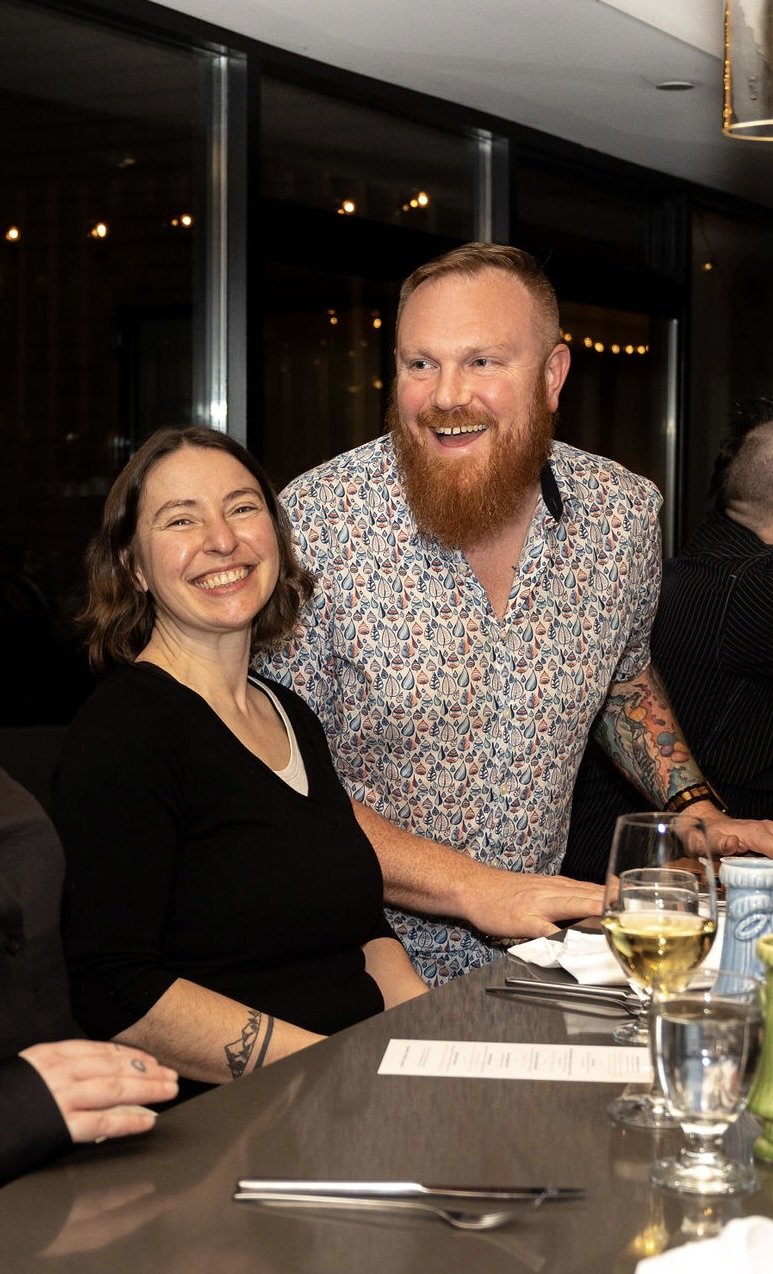A Sons of Vancouver co-owner and distiller interviews distiller Laura Carbonell about bees and distilling from honey, women in spirits and the joy of slushy drinks.
Laura Carbonell and Wayward co-founder Dave Brimacombe in their natural environment! Photo credit Leila Kwok.
Favourite Canadian craft spirit:
Monashee Spirits’ Triticale Whisky
Favourite cocktail:
Sidecar, classic Daiquiri, Bees Knees: basically all three-ingredient variations on sours.
Guilty pleasure drink:
I just bought a slushy machine for a side project where I'm converting an old horse trailer into a mobile cocktail bar, so I am drinking a lot of boozy slushies this summer for recipe development.
Best-selling spirit:
In winter it's Krupnik, a traditional Polish spiced honey liqueur. In springtime, it's our raspberry gin liqueur. This summer, our new release, Bee Champion Craft Gin, is giving the raspberry a run for its money though, so we’ll see who comes out on top.
What got you into distilling?
I’ve been really lucky to have some very cool jobs throughout the years, one of which was a tank driver with the Armed Forces. I met Dave [Brimacombe], Wayward's founder, through the military, and we’ve been friends for about 20 years now.
It was my husband, Curt, who first joined Wayward as a distiller. It can take up to six months to release from the military, so I came down [to the distillery] in the meantime to lend a hand until Curt got there. By the time he did, Wayward had grown enough that we both wound up staying on. I looked after the fermentation and Curt looked after the distillation.
A few years ago, Curt had the opportunity to go back to school, so I took on the distilling role and got to learn all about distilling as well. We’re lucky to have some very cool ladies visit the distillery regularly who are part of a group called Les Dames d’Escoffier. They let me know about a scholarship opportunity through their organization which helped fund my distilling education. I studied super hard and finished my diploma in distilling through the Institute of Brewing and Distilling in the UK last June.
Wayward is known for fermenting and distilling honey. What would you say is the trickiest part of that, both fermentation- and distillation-wise? Any neat tricks of the trade you could share with other honey distillers?
Stored honey just plain doesn’t spoil. They have found jars of honey in a 3,000-year-old Egyptian tomb which are theoretically still good to eat. This is a boon in that honey fermentations are less likely to become infected, but it also means that you must be very deliberate in creating the right conditions for the type of yeast that you have chosen.
The amount of sugar in your ferment needs to be enough for yeast to eat, grow and make alcohol, but not enough to stress their cell walls. There are also very few nutrients in honey for the yeast to use, so you will need to really nail down the nutrient schedule for your yeast to keep them healthy and [producing] desirable flavours.
When I’m distilling honey spirit, I’m never very far away from the still during the hearts cut so I can keep checking that we are drawing off clean, yummy flavours, but not so clean that we eliminate the honey character that we’ve worked so hard to carry through: it’s a fine line.
You recently moved into fermenting and distilling from grain in the past few years as well. Why the switch? How have you found this has changed your production process and product line-up?
We added wheat-based spirits a couple of years ago as an opportunity to increase our product offerings without overworking our bees and beekeepers. We can thoughtfully choose where we use our beautiful, single-source honey.
We work hard when scheduling our production to make sure that there is a distinct break between when we are handling honey and when we are handling grain to make sure that those products can stay separate and retain their own special characteristics.
I’ve heard you recently attended a women in whisky mentorship program. How was that experience?
The mentorship program has been awesome. It’s called the OurWhisky Foundation, and its mission is to support women in the spirits industry. They paired me up with an absolute rockstar of a mentor who has been happy to share a bunch of super valuable resources, chat about their lifetime of experience and answer all my weird, out-of-the-blue questions.
My biggest takeaway from the mentorship program was that it helped me to focus on what my current values and goals are. It can be easy to get swept up in the busy-ness of a production schedule. The mentorship program made me take a broader look at what was important to me and figure out how to carve out time to work on those things.
I hear Wayward collects and uses its own honey, as well. Tell me some weird facts about bees and why you love them so much.
A few years ago, the water main broke on the side of our building, and we had to dig that whole section up to replace it. When everything was back in place, instead of planting grass we decided to seed it with micro-clover. Shortly afterwards, we met a beekeeper who helped us install an observation hive in the window of our tasting room, so guests could watch the bees working in their hive while they were sampling our spirits. It’s just continued to grow from there.
A single bee will make one-12th of a teaspoon of honey in her lifetime. The honey that we use is the result of hundreds of thousands of bees working together. Also, because bees don’t usually fly further than a three-kilometer radius from their hive, the honey we get from our bees at the distillery is a collection of all of the flavors from our local area. Talk about terroir!

